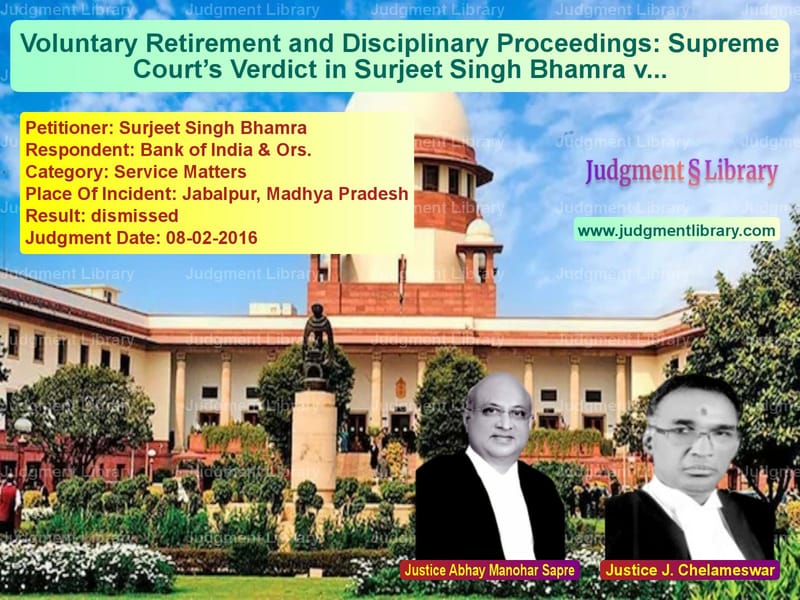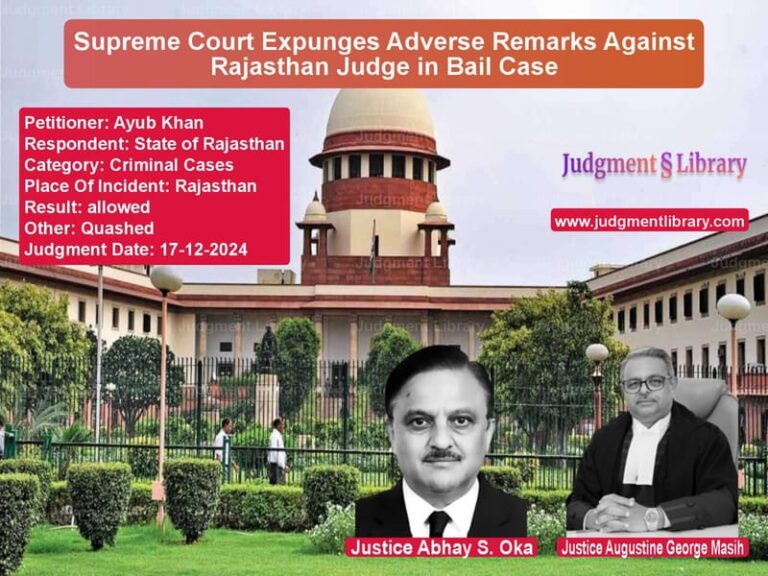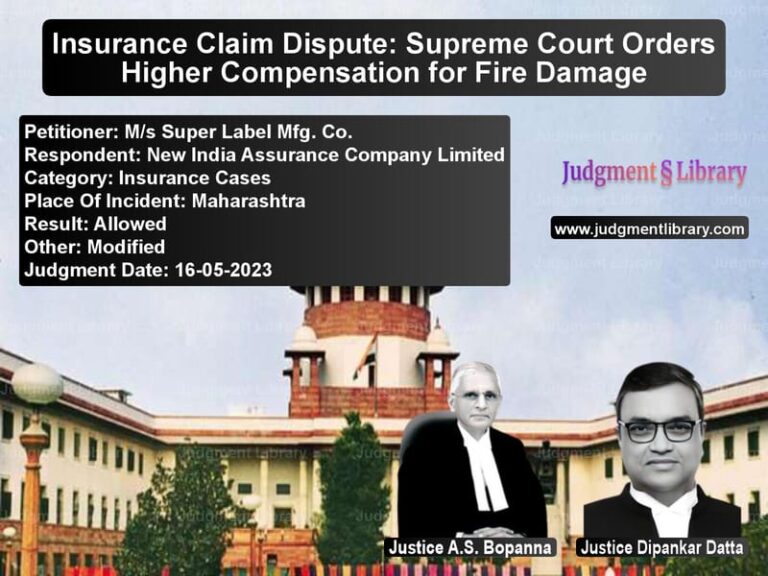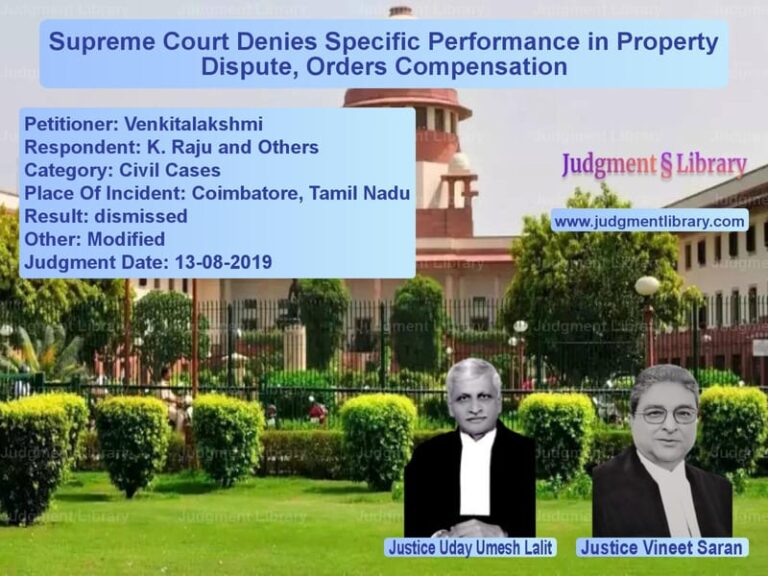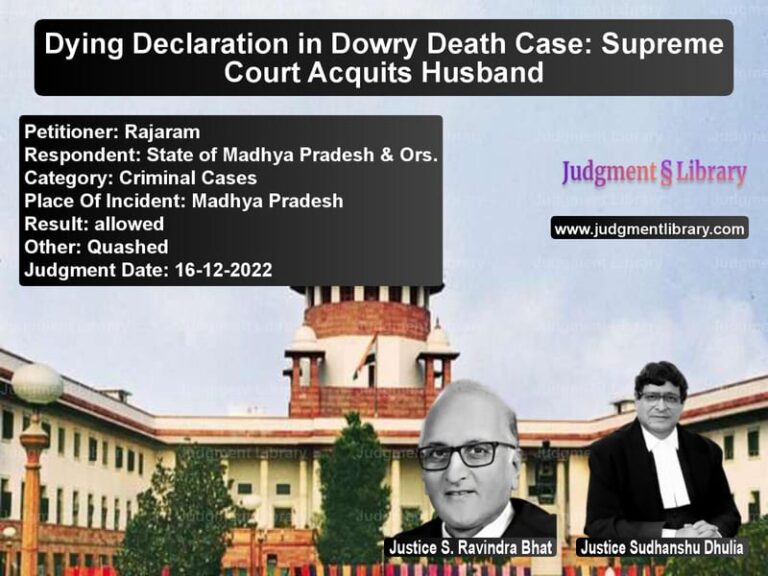Voluntary Retirement and Disciplinary Proceedings: Supreme Court’s Verdict in Surjeet Singh Bhamra vs. Bank of India
The case of Surjeet Singh Bhamra vs. Bank of India revolves around a crucial legal question regarding voluntary retirement and the employer’s right to initiate disciplinary action before granting retirement. This case clarifies the interpretation of service rules, voluntary retirement schemes, and the employer’s authority in handling pending disciplinary cases before granting an employee’s retirement request.
Background of the Case
The appellant, Surjeet Singh Bhamra, was a bank employee serving as a Branch Manager at the Panagar Branch, Jabalpur. During his tenure from 04.07.1996 to 26.05.1999, he claimed to have improved the bank’s financial standing significantly. However, despite these claims, the Bank of India found certain irregularities in loan disbursements during his tenure.
On 08.09.2000, the Bank of India issued a memorandum detailing several irregularities committed by the appellant. The appellant was asked to submit a response, which he did on 18.10.2000. In the meantime, the bank introduced the Bank of India Voluntary Retirement Scheme, 2000 (VRS), inviting employees to opt for early retirement under specific terms.
Sequence of Events Leading to the Dispute
- 01.11.2000: The Bank of India announced its Voluntary Retirement Scheme (VRS), which aimed to reduce surplus workforce. Employees had until 14.12.2000 to submit applications.
- 16.11.2000: The appellant applied for voluntary retirement under the scheme.
- 02.03.2001: Before the retirement decision was processed, the bank issued a charge sheet against him regarding irregularities in loan disbursements.
- 13.03.2001: The appellant accepted the charges.
- 20.03.2001: The Bank imposed a penalty of reducing his basic pay by five stages for three years.
- 19.06.2001: The Bank finally accepted his retirement application.
Petitioner’s Arguments
The appellant challenged the Bank’s actions, arguing:
- The bank’s VRS required it to approve or reject applications by 31.12.2000. Since no decision was communicated, his retirement should be deemed to have taken effect from that date.
- The Bank had no authority to issue a charge sheet and initiate disciplinary action after his effective retirement date.
- The punishment imposed on him was disproportionate to the charges.
Respondent’s Arguments
The Bank of India defended its position with the following arguments:
- The VRS did not provide for automatic acceptance. Each application had to be reviewed and explicitly accepted by the Bank.
- Since the Bank had initiated disciplinary proceedings before approving the retirement, it had the right to conclude the process before retirement.
- The appellant had admitted his guilt, and the penalty was reasonable.
High Court’s Decision
The High Court dismissed the appellant’s petition, stating:
- The retirement was not automatic and required explicit approval from the Bank.
- The Bank acted within its rights to complete disciplinary proceedings before granting voluntary retirement.
- The penalty imposed was valid and appropriate.
Supreme Court’s Decision
The Supreme Court upheld the High Court’s ruling and made the following key observations:
- The VRS scheme was partly mandatory for employees but directory for the Bank. Employees had to apply within a deadline, but the Bank had discretion in granting or denying the request.
- Since the appellant remained in service until 19.06.2001, the Bank was within its rights to issue a charge sheet and take disciplinary action.
- The penalty imposed was justified given the appellant’s admission of guilt.
Legal Precedents and Interpretation
The Supreme Court relied on legal precedents to determine whether the VRS scheme should be interpreted as creating a mandatory retirement date. It ruled that:
- A voluntary retirement cannot take effect until the employer explicitly accepts the application.
- Where disciplinary proceedings are pending, the employer retains the right to delay acceptance of voluntary retirement.
- The onus of ensuring compliance with service rules rests with the employee.
Final Verdict
The Supreme Court dismissed the appeal, ruling:
- The penalty imposed on the appellant was legal and proportionate.
- The employer had full discretion to finalize disciplinary proceedings before processing a voluntary retirement application.
- The VRS scheme did not allow for automatic retirement in the absence of an explicit decision.
Implications of the Judgment
This ruling establishes key principles in employment law:
- Employees cannot assume retirement without an explicit acceptance from their employer.
- Pending disciplinary cases must be resolved before retirement is granted.
- Employers retain authority to impose penalties even after an employee applies for retirement.
Conclusion
The Supreme Court’s ruling in this case reinforces that voluntary retirement does not create a legal obligation on the employer until formally accepted. The employer retains control over disciplinary matters, ensuring that employees do not evade accountability by applying for voluntary retirement. This judgment serves as an important precedent in employment law and workplace governance.
Don’t miss out on the full details! Download the complete judgment in PDF format below and gain valuable insights instantly!
Download Judgment: Surjeet Singh Bhamra vs Bank of India & Ors. Supreme Court of India Judgment Dated 08-02-2016-1741852577011.pdf
Direct Downlaod Judgment: Direct downlaod this Judgment
See all petitions in Employment Disputes
See all petitions in Disciplinary Proceedings
See all petitions in Public Sector Employees
See all petitions in Judgment by Abhay Manohar Sapre
See all petitions in Judgment by J. Chelameswar
See all petitions in dismissed
See all petitions in supreme court of India judgments February 2016
See all petitions in 2016 judgments
See all posts in Service Matters Category
See all allowed petitions in Service Matters Category
See all Dismissed petitions in Service Matters Category
See all partially allowed petitions in Service Matters Category

